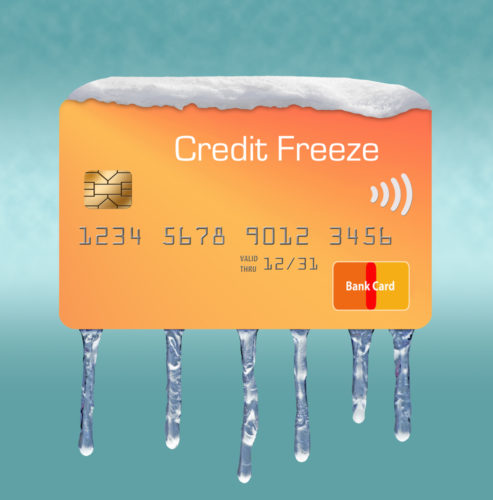Although the Insurance Information Institute reports that the overall number of identity theft cases declined between 2017 and 2018, the actual cost of identity theft continues to rise. In 2018 alone, consumers spent $1.7 billion on out-of-pocket identity theft costs, more than double what they spent in 2016.
New technology, such as chip-embedded debit and credit cards, has contributed somewhat to the decline in identity theft, but there is more you can do to protect your credit and finances from theft. One effective way to prevent fraudsters from opening new accounts in your name is to freeze your credit.
Freezing your credit means that you lock the information in your credit report, only allowing it to be viewed when you provide consent. Even if someone has key identifying details (i.e., your Social Security number and birthdate), they will not be able to see any of the information contained in your credit report. This thwarts thieves who try to open accounts in your name, as potential creditors will not be able to see the information contained in your report and thus would be forced to decline the application.
If you aren’t in the process of applying for loans or other new accounts, freezing your credit adds a layer of protection to your credit report. It doesn’t affect your credit score, and you can unfreeze your credit with a unique PIN or password at any time. You won’t be protected against all types of fraud, such as unauthorized charges on existing accounts, but a credit freeze does prevent thieves from opening new accounts in your name.
Table of Contents
Reasons to Freeze Your Credit
Freezing your credit when you aren’t actively applying for new accounts is a good idea to help reduce your risk of identity theft. Moreover, there are some situations in which initiating a credit freeze is a first step toward mitigating damage.
Victim of a Data Breach
Data breaches have become a fact of life. It’s not really a matter of if your personal information will be exposed, but when it will be exposed. If you receive notification that your information has potentially been compromised, or you do business with a company that experiences a breach, initiating a credit freeze can render your information useless to a criminal attempting to open new accounts.
Victim of Identity Theft
If your personal information has been stolen, a credit freeze can help limit further damage. When your credit is frozen, the number of new fraudulent accounts is limited.
Concern Over Child’s Safety
Identity thieves often target children, who generally have spotless credit histories, making it easier for them to open new accounts. It could be years before parents realize their child’s identity has been compromised, and by then the damage is severe. Freezing your child’s credit prevents anyone from opening new accounts in their name.
How Do I Freeze My Credit Score?
Even if you subscribe to an identity protection service, you must initiate a credit freeze yourself with each of the major credit bureaus.
Contact All Three Major Credit Bureau
All three credit bureaus allow you to freeze your credit online. You’ll typically need to provide identifying information, confirm your identity, and agree to the terms of the freeze.
- Equifax: To initiate a freeze, visit Equifax.com and click on the link to “Freeze My Equifax Credit Report.” From there you’ll fill out an online form, and confirm your identity via either an e-mailed one-time code, or by answering some questions about your credit history. Once your information is validated, follow the prompts to place the freeze on your credit.
- Experian: To freeze your credit with Experian, visit the Security Freeze Center, and click on “Add a security freeze.” Choose the option to freeze your own credit, and fill out the form. You’ll need to supply your name, address, email, birth date, and Social Security number. You’ll also be given the option to create a PIN or have one assigned. Once you submit the application, and confirm your identity, the freeze will be in place.
- TransUnion: To initiate a credit freeze with TransUnion, visit the Credit Freeze page and click on the “Freeze My Credit Tab.” The form will request your name, address, e-mail, phone number, date of birth and the last four digits of your Social Security number. Once you create an account, answer some specific questions about your credit history to confirm your identity. From there you’ll be taken to a page where you can add a credit freeze, and create your own PIN for future access to the freeze.
Receive a PIN
When you freeze your credit, you still have control over who can see your report. If you are applying for new credit, you can temporarily unfreeze your reports so lenders can make a decision. To do so, you’ll need to log in to your account with the credit bureau and supply a PIN to lift the freeze.
Both Experian and TransUnion allow you to create your own PIN number when you apply the freeze, or they will create one for you upon request. When you initiate a freeze with Equifax, you automatically create a myEquifax account. When you log in, you can manage your freeze by following the prompts; you’ll need to confirm your identity by answering questions about your credit profile in order to remove the freeze.
Manage Your Credit Freeze
One of the most important things to remember about putting a freeze on your credit is that it will prevent lenders from seeing your report, so if you’re in the process of applying for credit, wait to put the freeze on until you have established your new accounts. The credit bureaus will allow you to permanently or temporarily lift the freeze as needed; Equifax, for instance, allows you to set specific dates when the freeze won’t be in effect.
Keep in mind that the freeze doesn’t prevent everyone from looking at your credit. Existing creditors and debt collectors can still view the report, as well as certain government agencies (i.e., the IRS and child support enforcement.) Marketers can still perform soft inquiries to make offers of credit, and employers can still look at an amended report with your permission. And of course you can always look at your own credit report, regardless of the freeze status.
Downsides of Freezing Credit
Freezing your credit does provide protection against some aspects of identity theft, but it’s not entirely foolproof. In fact, there are some downsides.
- False sense of security: Freezing your credit can prevent new fraudulent accounts, but it doesn’t mean you’re impervious to identity theft. If your Social Security number is compromised, fraudsters can still use it for tax refund or health care fraud. It also doesn’t protect you from fraud on your existing accounts. Therefore, you still need to carefully monitor your monthly statements and check your credit to watch for signs of identity theft.
- It takes time: Freezing your credit isn’t an instant process, as you need to contact each bureau individually. It’s not a difficult process, but it can take some time to fill out the forms and confirm your identity. It’s also important that you keep good records related to your freeze, in particular your PIN, so you can manage it as necessary.
- Need to plan in advance: If you need to apply for credit, you’ll have to plan ahead to lift the freeze before submitting applications. You won’t be able to apply for store credit cards on impulse, for example, so keep that in mind when you place the freeze.
What Is the Cost of a Credit Freeze?
Although some of the credit bureaus offer credit lock services for a fee, which allow you to lock and unlock your credit report immediately as needed, credit freezes are free. This hasn’t always been the case, but a 2018 federal law made credit freezes free to all consumers. The freeze also will not affect your credit score, so it’s recommended for everyone as a protection from identity theft.
Image Source: https://depositphotos.com/




